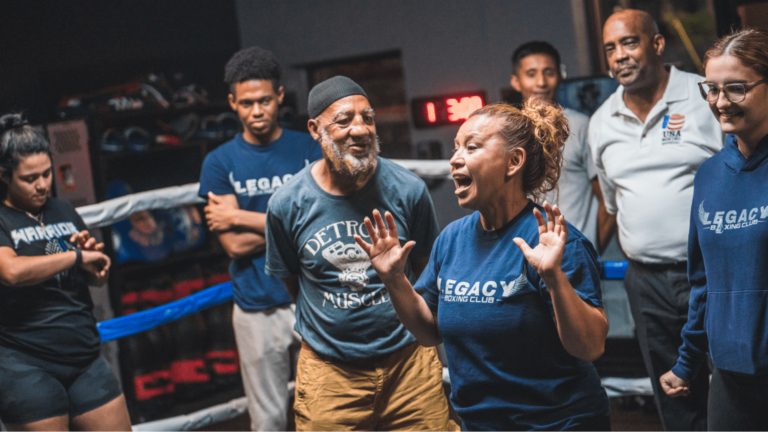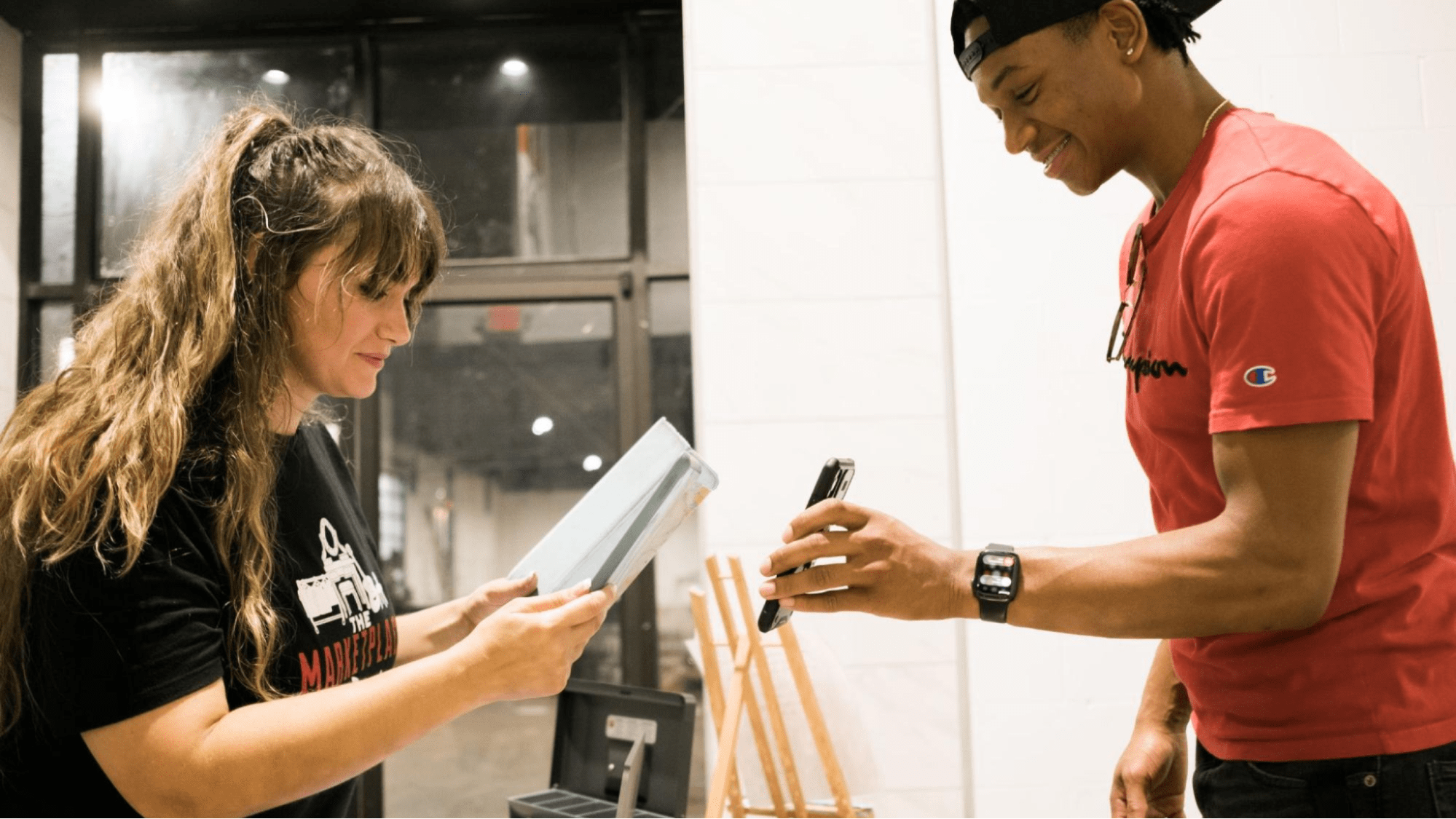Every event organizer who wants to scale eventually has to come to terms with the fact that event staff training is not optional. You can't be in two places at once or control everything, so you need to depend on your crew, rain or shine. There’s simply no way around it—not without substantial risk of things going wrong, at least.
Here’s some good news: Training your on-ground staff is good for business too.
A report by ATD Research found that companies that invest in employee training for on-ground staff experience a 24% higher profit margin. SurveyMonkey also discovered that workplace training programs help employees do better work. 59% said it improves their performance and 41% claimed it helps with their time management skills.
It kinda makes sense, right? When your staff feels more equipped to do their job, they do it quicker and better. Naturally, this results in higher productivity and increased earnings.
I hear you saying, “Okay, I see what you mean, but how do I instantly build a training program?”
To help you get started, I spoke to Bar Crawl USA, a large event organizer that runs unique bar crawl events in multiple cities concurrently, to learn how they do this successfully. Since 2016, they’ve hosted thousands of participants for and partnered up with 100’s of bars.
As an event creator myself, I am incredibly impressed with how tight of a ship they run — it’s no small feat to be able to consistently trust your event leads to run the entire show without your physical presence there. Yet, they have managed to do this time and again.
Follow in their footsteps with this guide. I have compiled real-life examples and actionable advice from their 9+ years of event-organizing experiences to create a solid template that anyone can use to build their own staff training playbook.
1. Assemble the right staff
You’re better off hiring event staff with the right attitude and skills than training someone from scratch.
A clear understanding of what you’re hiring them to do—with a list of job responsibilities—will help you set clear expectations right away.
For instance, for Bar Crawl USA, it's important that the event staff can sell tickets at the door and check in attendees effectively. “Finding a person who can both use the Eventbrite Organizer app to check-in guests but also be personable, engaging, and professional is the true challenge—especially when you consider that this is the first person 1000 crawlers will see at our events.”
This is why the right personality fit is super important, too. You want to hire someone who has the right balance of type-A precision and laid-back presence—someone who is sharp enough to think on their feet, but still fun enough to belong.
Bar Crawl USA recommends looking for staff with these traits:
Tech-savvy
Most event operations these days are run through digital platforms, including ticketing, check-ins, and communication with attendees. Anyone involved in the event execution process should be comfortable with tech.
Look for tech-savvy event staff, but don’t assume they will know your specific systems. Train your event staff on using any software or tech they will use for your events.
💡Pro tip: You can test new staff’s preparedness with simulations that test their ability to use tech and their judgment to solve real-life scenarios. For instance, simulate a check-in scenario where they have the wrong login details and need to quickly resolve the issue. Then, they have a feedback session to discuss what the staff did correctly in the situation and what could have been better.
Personable
When my DJ friend increased his rates for his services, he was worried that there would be fewer shows coming his way. Instead, his clients kept hiring him. “We went with you because you smile so much when you are working — it really adds to the positivity of the day”, they tell him.
It’s impossible to overstate the importance of “serving with a smile” in an event setting. When your event staff enjoys their job, this is much easier to accomplish.
Your event staff will need to coordinate with other staff, possibly manage the venue, serve attendees, and resolve customer issues — so it’s important that they like being around other people. It is easy to tell when they do and when they don’t.
Take this example from Bar Crawl USA’s Instagram page. They regularly have big crowds (wherein people are partying and drinking!), so things can quickly get chaotic. The staff needs to be personable under pressure and still use tact to solve any issues that arise.
Accountable
Things do go wrong at an event — you need a staff member who is less concerned with looking at fault, and more concerned with saving the event.
Let me tell you a story to emphasize how important this is.
The short version is that a friend of mine avoided a big lawsuit by hiring the right people.
The long story goes like this:
His event company was one of two events in charge of the sound and lighting setup for a corporate awards night. During the event, a VIP guest tripped over an uncovered wire, and the furious client threatened to sue both companies. Rather than getting defensive, my friend’s event manager focused on de-escalating the situation and convincing the client to review the CCTV footage before taking legal action.
The CCTV footage revealed the truth: the other company was responsible for the negligence. He and his company came out looking like real champs for saving the event and walked away scot-free.
💡Pro tip: It can be hard to ascertain if an event staff member will be accountable during the hiring process. Bar Crawl USA has found a secret hack for this. “We do love hiring people who have worked in bars, restaurants, or hotels before. In some form of hospitality does help out a lot.”
They believe that such customer-facing roles prepare you to deal with emotions of all kinds — especially difficult ones.
Punctual
Event schedules can be derailed even if one member of your event staff is late, and if the delay is too prolonged, your attendees may lose trust in your brand.
I can’t emphasize the importance of hiring someone who attempts to be early, rather than making it somewhere in the nick of time. This gives them time to settle in before the event starts and get into the right mindset for guest arrival. Not to mention, it compensates for any unexpected delays they may face on the way.
Still, military-level punctuality isn’t something that comes naturally to everyone. Follow these steps to nurture this among your staff:
1. Set clear expectations: Define what being "on time" means and explain the impact of lateness on the event and team.
2. Sort out transportation and parking in advance: Clarify where they should park and provide a parking layout plan if possible. If staff members do not have personal vehicles or need a shuttle to and from the venue, make arrangements in advance.
3. Improve your check-in process: Clarify check-in procedures in advance. Have your event lead meet the staff at the designated check-in location and document each staff member’s arrival and departure time.
4. Reward punctuality and punish tardiness: Give out bonuses to staff who are consistently on time and enforce consequences for those who aren’t. This can include loss of shifts, or disciplinary action. Explain this during the punctuality training too.
5. Consider their feedback: Sometimes, despite their best efforts, your staff can face hurdles that prevent them from being on time. Hear their concerns with an open mind and make adjustments to your processes accordingly.
💡Pro tip: It’s best to expect the unexpected at events. You can’t predict last-minute emergencies, accidents, or human mistakes that could interfere with the event schedule. Always have contingency plans for when things go wrong. We recommend hiring a few extra people as backup staff (aka floaters) too. Floaters can also take over while your permanent staff takes scheduled breaks to recharge.
2. Offer competitive compensation
For the last ticketed party event my partner and I threw, one new DJ helped us sell 30 ticket purchases all on his own. How did it happen?
He went out of his way to promote the party on his social media, even sending personal invites to his friends to join us on the day. All of this because we didn’t offer “exposure” for his valuable services or exploit him with low payments.
There’s a lesson here: People are genuinely motivated to give their best when you incentivize them to deliver high-level service.
Bar Crawl USA seconds our approach. As an event organizer, they expect high-level service from their team and are willing to pay for it. “We empower each of our leads by paying them 10% of the profits. If it is a smaller event we pay a great $25 an hour wage, but if it is a large event they will get upwards of $50-$100 an hour.”
They find that this ups the stakes and reward for them and forces them to care about event execution like the owner of the company.
This incentive program has also helped them build the backbone of the entire operation: reliable staff with low turnover. “We’ve had leads/managers in cities be with us since the beginning (9 years) because we pay well, we communicate, we are personable, and we care.” Impressive!
3. Provide on-the-job training
Depending on the role the event staff will have, their training needs will differ slightly. For example, check-in staff don’t need setup training, but your setup crew might need additional direction on staging and AV equipment.
Your staff will typically need to be trained separately for each of these responsibilities:
| Responsibilities | Guidelines | How to implement |
| Arrival and Check-in on event day | Specify how long before each event the staff should arrive. Communicate the check-in time and location in advance. | Share an event schedule in advance with all the team members. At the check-in point, have the event manager give a briefing to the crew. |
| Set up requirements | Specify when the setup should be completed. Train staff on how to set up equipment according to the event layout. | Create a set-up checklist to track the handling of all equipment, tables, chairs, barricades, etc. You can also include finer points in the checklist such as “Did you cover all wires in the pedestrian path?” for quality control. Share the event layout plan in advance and brief the team on-site. Assign the event manager to supervise the setup. |
| Coordination with the venue | Some venues require event companies to fill out paperwork to use the venue for set up before the event day. Set guidelines for when these permissions should be obtained. | Obtain the list of the venue’s rules and procedures and brief your event crew. Provide the venue liaison’s contact details for quick coordination. |
Tech and equipment training | Determine which tech will be used on the event day. | Train them on how to use ticket scanners, check-in wristbands, and other secondary tech like handheld radio. |
| Guest experience and service | Set expectations for guest interactions, dress code, and handling complaints professionally. | Role-play common guest questions to prepare staff. |
| Communication expectations | Your staff should know who to contact in case of a security issue or logistical challenge. Define the chain of command so there is no confusion. | Provide a contact list with details of event leads, venue managers, event security heads, and talents. Prepare an organization chart that lays down the chain of command. Have an introduction when a new event staff joins the team, introducing them to the existing staff. |
| Venue Layout and Guest Flow | Staff should know the venue layout by heart so they can answer customer questions and guide the guest movement effectively. Train them on how to direct crowds, prevent bottlenecks, and manage long lines. | Share an event map that shows the location of restrooms, bars, seats, entry and exit points, event stage area, etc for their reference. If possible, have real drills in the venue. For instance, have the new hire escort a VIP from the check-in area to the VIP area. |
| Ticketing and Payments Training | Train them on how to use ticketing POS systems. Make sure they know the finer points of the payment and refund policy so they can answer customer questions confidently. Set rules on how to handle cash payments. | For large volumes of cash, have a minimum two-person verification protocol. Provide lockboxes for safety if needed. |
| Emergency Readiness | Staff should know what to do in case of a fire, disaster, or security breach. Have drills to test their preparedness for these situations. Assign emergency contacts, including dedicated first responders among the staff. | Prepare an emergency readiness plan and brief the team on it. Include a layout of the venue with all the safety exits. They should also be able to pinpoint the location of fire extinguishers and first-aid kits. |
| Health and Safety Training | It is wise to have a dedicated security team at events. Still, your event staff should be able to identify and deal with minor issues like intoxicated guests or managing large groups. | Run simulations that teach them how to respond to such situations. They should also know when to escalate the matter to the security team. Use our event safety checklist to keep track of things. |
| Accessibility Training | Staff should be trained on how to handle special requests and provide assistance for specially-abled guests. | Use the ADA compliance guide for events as a reference. Teach staff to ask how they can assist rather than assuming. Use our detailed event accessibility checklist as a reference. |
We recommend using this as a reference to create different training manuals for each job role. It’s a bit of work, but the investment is well worth it.
4. Use technology to smooth things out
Even if your staff is well-trained, using tech to help move things along faster is a good idea.
Here are some ways you can incorporate tech in your process to streamline things:
1. Train your event staff with immersive experiences: Take your training to the next level with VR tech platforms like Tale Spin or Warp VR. They can build scenarios that put staff in situations that would be too costly or risky for them to deal with in real life.
2. Encourage punctuality among staff with reminders: Create a Google Calendar entry for the event and send automated reminders using SMS Reminder for Google Calendar app to your event staff. You can also use SMS automation apps for this.
3. Track staff’s arrival and departure time: Use a facial-recognition attendance tracking tool like Jibble for this. This will keep everyone accountable.
4. Manage on-ground event logistics: Using the Eventbrite organizer app, your staff can check-in guests speedily at the event (prevents long queues!), accept cashless payments from their phone using tap to tap-to-pay feature, and track overall sales. You can also remotely monitor event logistics in real-time.
5. Be empathetic and provide actionable feedback
Despite your best efforts to train staff, remember that some things can only come with on-ground experience. Don’t let the high-stress environment of a bad event spill over to your new event staff—keep your feedback constructive and professional.
Bar Crawl USA also seconds this approach. “Showing empathy, listening, and offering assistance/guidance can go a long way to making a staff member feel comfortable and excited about running events for you.” As successful events depend heavily on the enthusiasm of the staff, this is not to be taken lightly.
Let your new hires shadow you to learn how to develop something I like to call “event logic.” This will prepare them to look for details they would otherwise miss. Remember that lawsuit story from before? My friend’s staff knew what was more important at the moment without any new instructions—that’s event logic.
You want to nurture this as much as possible but expect that they won’t have it on the first day. Look for someone receptive to feedback and mold them from there.
Bar Crawl USA also does the same thing. “We are usually there assisting, training, and helping with the set-up and check-in process at least for their first event. They want to see how we do it—and we want to show them how we do it and want it to be done.”.
6. Communicate, communicate, communicate
Your staff should know who to contact before, during, and after the event. Set up an appropriate communication channel for each stage of the event and lay down the plan.
For instance, a simple WhatsApp or Slack group can work before the event but you might probably need handheld radios for the event day. A post-mortem session can be scheduled in person or via Zoom.
💡Pro tip: You might not always be physically present to answer each query. Bar Crawl USA recommends providing any login info or tools your staff will need beforehand so they can get comfortable with it. You want them to engage with the attendees on the event day without worrying about what to do or how to do it. How do they do this?
They create and send out a playbook for each event that details everything that will happen in the week of the event in advance. This allows staff to ask questions before the event rather than having to guess or call them on the day.
“We also provide our cell numbers and let them know to call or text at any time,” they add.
Speed up staff training with Eventbrite
Investing in staff training isn’t just about smoother operations. A well-prepared team means happier guests, better reviews, and ultimately, a more successful event.
But the process of training event staff is long and resource-intensive. If you simplify your processes before you create a training playbook, it will be easier to onboard new staff seamlessly.
Use the Eventbrite platform to centralize your event processes in one place. Find and book venues, sell tickets, perform marketing activities, and manage real-time logistics like accepting payments and guest check-ins seamlessly.
Not sure how to start? Use our step-by-step event set-up checklist to create your first event and start selling tickets seamlessly on Eventbrite.






